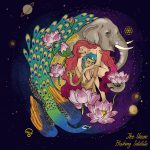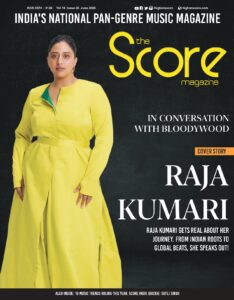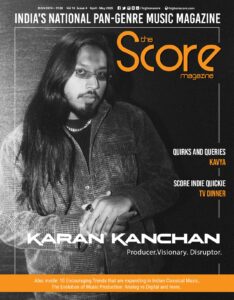Blushing Satellite (The Union):

As the name suggests, this Bangalore-based band is idiosyncratic, to say the least. Their music is languid, lush and leverages impulses to immerse oneself in good feeling. Their new album “The Union” ostensibly draws its thematic inspiration from multiple mythological and philosophical symbols: the coming together of Shiva and Shakti, Yin & Yang, Male & Female. It starts with a deep-throat chant that is common in various monastic prayers, and moves on to play with characteristic and uncharacteristic tones in novel melodic setups. The strings and drums and keys all meld into soft-yet-stimulating, soothing-yet-gripping musical tapestries. The songs revolve on easily identifiable concepts, and much like the progressions of human thought and emotion, they do not try to summarise ideas into easily digestible, radio-friendly nuggets. Rather, they let the music play out, following a certain wanderlust that would emerge from long hours of introspection. Rhythms can vary from minimalist to richly bombastic. “Divine Mother”, for instance, in its adulation of the divine feminine principle moves through diverse musical signatures- mimicking the cosmic impulse that it sings of. “Hide and Seek” is comforting, easy to get into (all thanks to that dimmed bass). My personal favourite is “Dream-Nightmare-Union”. Like its name, its moves from Lethe-like psychedelic relaxation to a carefully distorted paean to nightmare. The union comes after, when the soul has burned and bathed in trial and regret – a simple sheen of the saxophone, a frenetic pounce on the drums, mocking vocalization of misplaced desires and consequent loss. This is followed by a sweet surrender to balance reflected in perfect harmony, the realization that “It was just a dream”.
Tales from a Distant Galaxy (Mixtaped Monk):

The artist recommends that you listen to this album while imagining yourself as the protagonist of a sci-fi epic. I tried it, and I have to say, not half bad. Mixtaped Monk is known for experimenting with the expressive capabilities of instruments. In this album, he does not disappoint. The tracks all wallow in refreshing self-assurance. While they may not provide the ideal soundtrack to Dune or Solaris (common names for the epic sci-fi connoisseur), they do much to cause a mind drift. Think of yourself as interacting with a peaceful, cohesive intergalactic gathering that just wants to lie back and muse on definitions of God, and the songs fit right in. All of them have a similar progression, expressing a lazy distance from anything that might get you too worked up. It plays like a celebration of de-stress. I’m not saying I didn’t catch a glimpse of underlying doom in “Before Genesis”, but its self-indulgent tones are layered with such precise abandon that I can’t help but drown in it. “Inside Insanity” is a sneaky one. Collaborating with Cousin Silas, Mixtaped Monk turns this into a winding, pondering essay, but with a pungent little kick of distortion in the places. Try this if you are looking for something similar to Tangerine Dream or early Wilson, like Moonlop or Begonia Seduction Scheme, give it a whirl. By no means do I mean to establish an equivalency, but it might be something to explore if that is your thing.
Will You (A collaboration):

The words of Jalāl ad-Dīn Muhammad Rūmī do not simply ring true across time. They invigorate each reader with renewed meaning, purpose and ultimately liberation. When his immortal understanding of the human experience is embraced by a striking, ensemble, Will You is born. Among these musical admirers of Rumi are Iranian-American vocalist Katayoun Goudarzi, , sitar player Shujaat Khan, saxophonist Tim Ries (whose work includes playing with Jack DeJohnette and Donald Byrd, The Rolling Stones, Donald Fagen, and Rod Stewart), pianist Kevin Hays, and tabla player Dibyarka Chatterjee. Their skills in combination have inevitably unlocked new facets of Rumi’s enlightening words. “Don’t” offers a heartrending plea to relieve a woman’s lover of his torment. Goudarzi sings it with an ardour that would not be out of place in the tales of Laila-Majnu or Heer-Ranjha. Rumi’s love poetry has often epitomised the lover as the universal (or God), and the shuddering arrangements of strings and percussion leaves no stone unturned to exalt the words accordingly. Goudarzi’s voice is exceptional: she communicates devotion, passion and agony and just as easily switches to bliss with “Let Me”. Each instrument responds like a deprived lover to the next; the vocals are the prayer while the music serves as a conduit to all that is divine and worth loving.
The album is magnificent beyond description. It deserves every purchase, it deserves to be replayed and it will do nothing short to embedding itself into the heart, conquering it and goading it into a mad dance of ecstasy and loss until all is stilled. I promise you, you do not need to know the language (Persian poetry) to be elevated. If you do, it would probably help. But if you don’t, nothing is hindered. Go forth and ascend.
Monica Dogra (Naraye Mastana):

Monica Dogra’s recognizable aesthetic of poetry-passion-pathology disappoints in her adaptation of ‘Naraye Mastana’. The usually stunning songstress turns a Sufi gem by Abida Parveen into something that claims to be a “club banger”. While it has got a decent beat, the song does very little to substantiate the ethereal persona with which Dogra has defined her creed and career. She looks beautiful, but her equally exquisite voice is lost in the opacity and somewhat drab rhythm. One expected more.
Emergence (Can You Record Me?):

Out of Auroville comes a man who champion sustainable organic farming, Krishna Mckenzie. He has co-founded a band with French bassist Mishko M’Ba, drummer Soundar Rajan and popular city-based Carnatic violinist Karthick Iyer. And their third EP is a message calling for renewal, rejuvenation and awareness of the connection that humanity has with the soil. It’s a message well places in this environmentally bootstrapped world. Mckenzie’s faith in the intricate connection between nature and music creates the sense that their music knows exactly where it belongs. The song carries itself with determined ease. It does not dabble in unnecessary complexity and stays on point. The message is clearly the point of the track. Musically, it is not too innovative, but the Tamil vocals create an interesting back-and-forth. It is definitely a good song, and even if for the message alone, the band deserves wide publicity.
These reviews were published in our October 2017 issue: http://bit.ly/2zv3e5K








